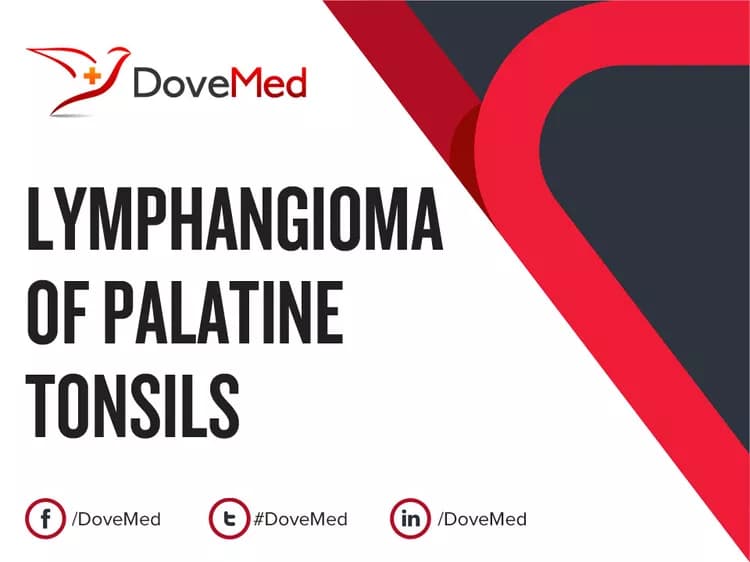What are the other Names for this Condition? (Also known as/Synonyms)
- Tonsilla Lymphangioma
What is Lymphangioma of Palatine Tonsils? (Definition/Background Information)
- Lymphangioma of Palatine Tonsils is a benign tumor resulting from proliferation of lymphatic vessels, occurring within the palatine tonsils (tonsils on both sides and back of the throat)
- A majority of the tumors are present at birth. The condition is usually diagnosed at birth, or within the first two decades of life
- Unlike congenital hemangiomas, Lymphangioma of Palatine Tonsils do not disappear (involute) as the individual gets older
Who gets Lymphangioma of Palatine Tonsils? (Age and Sex Distribution)
- Lymphangioma of Palatine Tonsils occur both in males and females
- About half of them are diagnosed at the time of birth; the remaining half diagnosed within the first 20 years
- No ethnic or racial predominance is noted
What are the Risk Factors for Lymphangioma of Palatine Tonsils? (Predisposing Factors)
Currently, no risk factors are known for the development of Lymphangioma of Palatine Tonsils.
It is important to note that having a risk factor does not mean that one will get the condition. A risk factor increases one's chances of getting a condition compared to an individual without the risk factors. Some risk factors are more important than others.
Also, not having a risk factor does not mean that an individual will not get the condition. It is always important to discuss the effect of risk factors with your health care provider.
What are the Causes of Lymphangioma of Palatine Tonsils? (Etiology)
- The cause of development of Lymphangioma of Palatine Tonsils is unknown
- Some researchers have thought this tumor to arise, either due to chronic inflammation, or due to obstruction of the lymphatic blood vessels
What are the Signs and Symptoms of Lymphangioma of Palatine Tonsils?
The signs and symptoms of Lymphangioma of Palatine Tonsils include:
- A mass in the oral cavity; presence of foreign body within the throat
- Difficulties in eating (dysphagia)
- Recurrent episodes of sore throat
- These tumors can also cause a chronic non-productive cough, due to irritation
- Rarely, if these tumors become large, then it may affect the voice of the individual
It is important to note that a majority of Lymphangioma of Palatine Tonsils does not result in any signs and symptoms (termed as asymptomatic occurrence).
How is Lymphangioma of Palatine Tonsils Diagnosed?
A diagnosis of Lymphangioma of Palatine Tonsils is usually made with a physical examination and a thorough medical history check.
- A surgical biopsy of the tumor is necessary for a definitive diagnosis
- Radiological studies may occasionally be performed, but are usually not necessary for a diagnosis
- The differential diagnosis for Lymphangioma of Palatine Tonsils includes squamous papilloma, epidermal inclusion cyst, benign capillary hemangioma, benign fibroma, benign lipoma, benign juvenile angiofibroma, and chondromas
Many clinical conditions may have similar signs and symptoms. Your healthcare provider may perform additional tests to rule out other clinical conditions to arrive at a definitive diagnosis.
What are the possible Complications of Lymphangioma of Palatine Tonsils?
- No significant complications are known to occur due to the tumor
- Lymphangioma of Palatine Tonsils has been known to recur after incomplete surgical removal. Hence, a wide surgical excision of the tumor is the preferred treatment method
How is Lymphangioma of Palatine Tonsils Treated?
A simple surgical excision/removal of Lymphangioma of Palatine Tonsils, results in a cure.
How can Lymphangioma of Palatine Tonsils be Prevented?
Currently, there are no methods known, to prevent the development of Lymphangioma of Palatine Tonsils.
What is the Prognosis of Lymphangioma of Palatine Tonsils? (Outcomes/Resolutions)
A complete surgical excision of Lymphangioma of Palatine Tonsils, results in an excellent prognosis.
Additional and Relevant Useful Information for Lymphangioma of Palatine Tonsils:
Lymphangiomas, in general, are benign tumors of lymph nodes that occur in three different types.
- The first type is called capillary or simple lymphangiomas. These tumors usually occur in the skin
- The second type is called cavernous lymphangioma, which occurs in subcutaneous tissue. These tumors consist of larger lymph nodes, when examined under a microscope by a pathologist
- The third type of lymphangiomasis called cystic hygromas, which occur as an enlarged lymphatic space in the form of a cyst, in the head and neck region
Related Articles
Test Your Knowledge
Asked by users
Related Centers
Related Specialties
Related Physicians
Related Procedures
Related Resources
Join DoveHubs
and connect with fellow professionals


0 Comments
Please log in to post a comment.